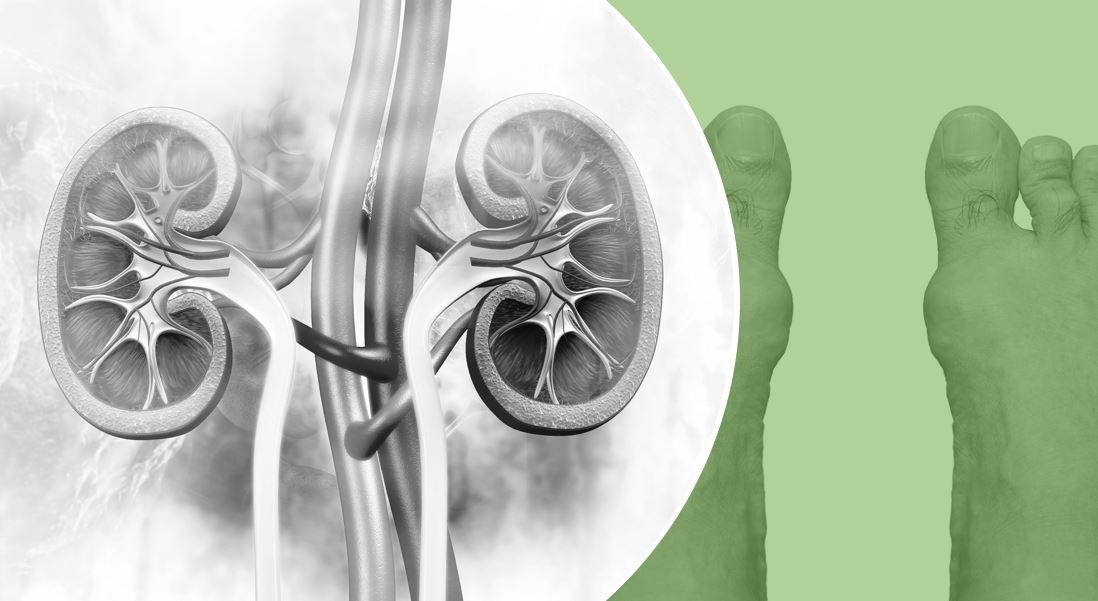Allopurinol Doesn’t Slow Kidney Disease
The gout treatment allopurinol doesn't appear to slow the progression of chronic kidney disease in patients with moderate to severe loss of kidney function, shows a study presented yesterday at the American Society of Nephrology Kidney Week annual meeting.
(©CrystalLight,AdobeStock); (©ShutterRyderShutterstock.com)

The gout treatment allopurinol doesn't appear to slow the progression of chronic kidney disease in patients with moderate to severe loss of kidney function, shows a study presented yesterday at the American Society of Nephrology Kidney Week annual meeting.
The findings, which were published in June in the New England Journal of Medicine, are based on a randomized, controlled trial of 369 patients with stage three or four chronic kidney disease, no history of gout and either urinary albumin-to-creatinine ratio ≥265 mg/g or eGFR decrease ≥3.0 mL/min/1.73 m2 in the preceding year. The patients were randomized to allopurinol or placebo with the primary outcome being a change in eGFR of up to 104 weeks using the CKD-EPI creatinine equation.
At baseline, 65 (18.5%) study participants had normal levels of uric acid (mean 5.9 mg/dL) and 287 (81.5%) had elevated uric acid levels (mean 8.7 mg/dL). There were no significant differences in change in eGFR between allopurinol and placebo in the group of patients with normal levels and the hyperuricemic group. The mean serum urate levels in the lowest, middle and highest tertiles were 6.3 mg/dL, 8.0 mg/dL and 10.0 mg/dL, respectively. The result for the primary outcome was consistent across all tertiles of baseline serum urate level.
There were no significant differences in the change in estimated glomerular filtration rate (eGFR) between the allopurinol group and the placebo group. Serious adverse events were reported in 84 of 182 patients (46%) in the allopurinol group and in 79 of 181 patients (44%) in the placebo group.
High uric acid in the blood is associated with albuminuria, the onset of chronic kidney disease, progression to end-stage kidney disease, cardiovascular events, and death. Uric acid, or the serum urate level, increases with decreasing glomerular filtration rate (GFR) due to reduced excretion. "Thus, it is unclear whether elevated serum urate levels play a causative role in the progression of kidney disease, are an indirect marker of decreased kidney function, or both," wrote authors who were led by Sunil V. Badve, Ph.D., in Australia.
"In patients with stage three or four chronic kidney disease and an elevated risk of disease progression, we did not observe that treatment with allopurinol resulted in slower eGFR decline than did placebo over the 104-week follow-up period, despite a sustained mean reduction of 35% in serum urate levels in the allopurinol group. Furthermore, we did not observe a greater decrease in proteinuria, blood pressure, or the risk of the composite kidney outcome of a decline in the eGFR (when either a 40% or a 30% decline from baseline was used), end-stage kidney disease, or death in association with allopurinol," the authors wrote.
_______
CITATION
ABSTRACT: PO0568. "The Effects of Allopurinol on the Progression of CKD According to Baseline Serum Urate Level: Results from Post Hoc Analyses of the CKD-FIX Trial," ASN Kidney Week, Oct. 22, 2021